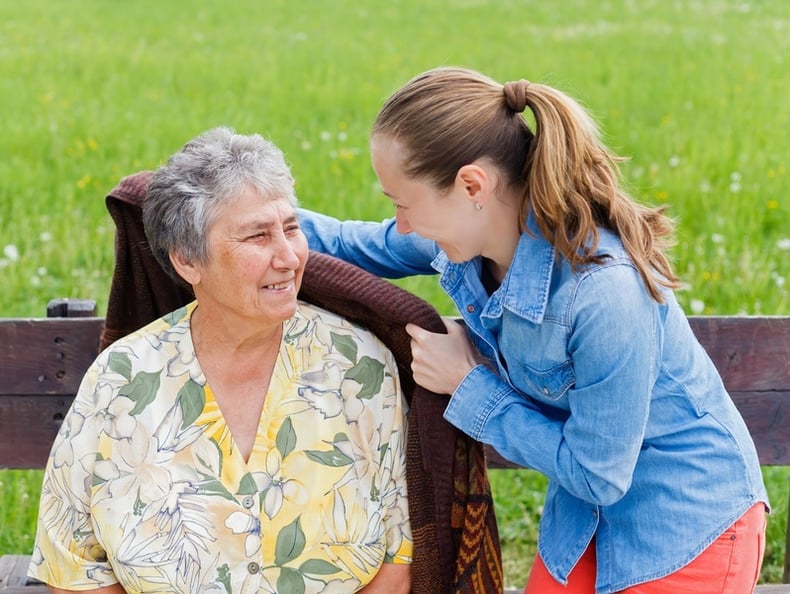
Burnout and empathy fatigue are significant challenges for family caregivers and professionals alike. They can cause depression, feelings of despair and hopelessness or worse.
But how do you prevent caregiver burnout? First and foremost, you need to be able to recognize its signs.
Today, let’s review what eight of those signs and symptoms are so you’ll know when to ask for additional help or arrange for respite care for your senior loved one.
1. Denial
One of the first signs of burnout is engaging false hopes. Dementia cannot, at present, be cured. Even with proper memory care, an older loved one with Alzheimer’s will never “get better.”
That can be an extraordinarily difficult situation for a family caregiver to accept. It can also lead to feelings of guilt and helplessness.
Taking a person-centered approach to providing care for your loved one — spending time with him or her, closely watching expressions or gestures for signs of discomfort, and soothing his or her fears — will help you to come to terms with the diagnosis, so that you can focus on enjoying your remaining time together.
2. Forgetting
Depression and caregiver fatigue can cause lapses in concentration. And that can be dangerous, if you’re providing care.
Did I give Mom her medicine this morning?
If you can’t remember, and give her another pill, you could cause a harmful overdose. But, if you didn’t, and what will happen if she doesn’t get the medication she needs today? That could be just as harmful.
If memory lapses are negatively affecting your ability to render care, you definitely need a breather.
3. Anxiety
You can’t be an effective caregiver if you’re in a panic. You won’t be able to do what your loved one needs you to do on his or her behalf — namely, to make clear, rational care decisions.
If the prospect of facing your loved one and providing care fills you with dread first thing every morning, or what-ifs keep you awake at night, you need to enlist help.
4. Irritability and anger
Anger is almost always rooted in feelings of fear or helplessness. When we know we can’t change a tough situation, we humans tend to lash out. It’s important to acknowledge that dementia results in only one possible outcome.
If you allow yourself to admit that there’s no way you can change the situation, you’re less likely to feel angered by it, and you can focus instead on the positive aspects of providing care: spending time with your loved one, recording and preserving what memories they still retain, and feeling a sense of fulfillment that you’re able to provide comfort for your loved one.
5. Exhaustion
If you feel tired all day long, no matter how much sleep you’ve gotten, or begin to suffer chronic aches and pains, you’re likely experiencing burnout. You won’t be able to help your loved one if you’re foggy or feeling physically drained.
It might help to sign your aging loved one up for adult day care. These programs allow family caregivers to have a few hours to themselves every day — to work, run errands, or just relax — while their relative with dementia is cared for in a safe, secure, and positive social environment.
6. Withdrawal or avoidance
Staying in the house, not engaging with friends or with other family members, or feeling no joy in activities that previously made you happy are all signs that you’re suffering from depression associated with severe caregiver burnout.
7. Feeling like you don’t care what happens next
If you catch yourself saying, or thinking, “I don’t care,” you need to ask for help. You’re a caregiver, not a carelacker.
When a family member cannot help him or herself, a caregiver can’t allow feelings of indifference or resignation to creep in. They lead to poor outcomes for all involved.''
8. Feeling like you want to hurt yourself or others
Red alert. You need caregiving assistance, fast. A respite care stay for your loved one, or permanent placement in residential memory care, is probably in order.
If you’re feeling like you want to hurt yourself, or hurt others, you need space to heal. And there’s no shame or guilt in that. Caregiving isn’t easy. It’s a grind. It can be a rewarding grind, in the end, but to understand how and why, it would probably help if you were talking to a professional therapist, who could help you navigate those negative feelings.
Are you suffering from some of the signs of caregiver burnout?
Episcopal Retirement Services can help.
Our Living Well Senior Solutions care managers can help you organize your loved one’s care plan and arrange for community-based services, like Deupree Meals On Wheels, that could lighten the load on you.
We also offer permanent placements for assisted living, skilled nursing, and memory care if your loved one is beginning to need more care than you can provide on your own.
If you’re suffering from empathy fatigue or caregiver burnout, let us help you and your loved one. Reach out to us today.












